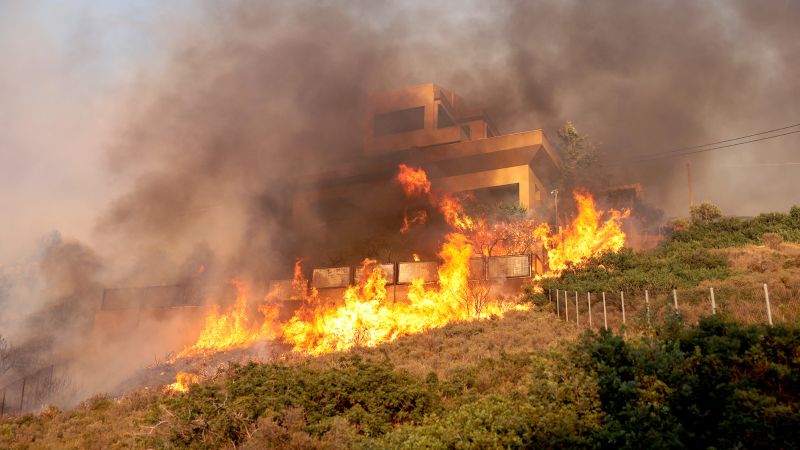Extreme Weather Records Broken as Scientists Warn of Unpredictable Chaos
Summer in the Northern Hemisphere is resembling an apocalypse movie, with heatwaves, floods, and fires dominating the headlines. But this may just be the beginning of the unpredictable chaos that awaits us if we don’t address climate change.
Unprecedented Extreme Weather
Just halfway through July, numerous extreme weather records have already been shattered. The South and Southwest United States are experiencing a relentless heatwave, with Phoenix, Arizona, enduring a record-breaking 19 consecutive days of temperatures over 110 degrees Fahrenheit. Emergency departments are overwhelmed with heat-related illnesses.
Southern Europe is also facing one of its most extreme heatwaves on record, leading to devastating wildfires in Greece, Spain, and Switzerland. Meanwhile, parts of Asia are sweltering in temperatures above 50 degrees Celsius, with deadly flooding occurring in South Korea, Japan, and northern India.
The New Normal?
The World Meteorological Organization has labeled this relentless cascade of extreme weather as “the new normal.” However, some scientists disagree with this framing. Hannah Cloke, a climate scientist and professor at the University of Reading, argues that until we stop emitting greenhouse gases, we cannot predict the future accurately.
Just the Beginning
Cloke is among the many scientists warning that this summer’s extreme weather is just the tip of the iceberg. As long as global temperatures continue to rise, we should brace ourselves for even more severe impacts.
Take Action Now
The time to act is now. We cannot afford to ignore the warning signs of climate change. By reducing greenhouse gas emissions and adopting sustainable practices, we can mitigate the worst effects of extreme weather events and protect our planet for future generations.
Climate scientist Michael E. Mann warns that what we are experiencing is not just a “new normal,” but rather “the new abnormal.” The impacts of climate change are becoming increasingly devastating as fossil fuel burning and warming continue. This is not a static state that we can simply adapt to; it’s a shifting baseline of ever-worsening consequences.
Surprising Anomalies and Record-Breaking Events
While scientists like Mann and Cloke expected this year’s extreme weather due to the development of El Niño and human-caused global warming, there have been some remarkable anomalies. Antarctica has experienced record-low levels of winter sea ice, and the North Atlantic has seen “off the charts” heat. These events serve as a stark reminder that if we continue burning fossil fuels, we can expect not only records to be broken but shattered.
The Accelerating Climate Crisis
As the climate crisis accelerates, we can anticipate even more surprises. The weather extremes will become more intense, and our weather patterns could change in unpredictable ways. Peter Stott, a science fellow in climate attribution at the UK Met Office, emphasizes the need to prepare for these changes.
Exceeding Climate Models’ Predictions
In some cases, the heat, fire, and floods we are witnessing are already surpassing what climate models have predicted. Mann attributes this to changes in the jet stream, further highlighting the complexity and urgency of the climate crisis.
Stay Informed and Take Action
Understanding the reality of extreme weather and climate change is crucial for individuals, communities, and policymakers. By staying informed and taking action to reduce our reliance on fossil fuels, we can work towards mitigating the impacts of climate change and creating a more sustainable future.The Jet Stream and Climate Extremes: What You Need to Know
The jet stream, a powerful atmospheric current, is influenced by the temperature difference between the poles and the equator. However, as the Arctic rapidly warms, this temperature difference decreases, causing the jet stream to slow down and weaken. The consequences of this can be significant, as weather systems can become stuck in one place for extended periods of time.
Unprecedented Weather Patterns
According to climate scientist Michael Mann, this phenomenon can lead to extreme weather patterns, such as prolonged heatwaves or heavy rainfall. The same region can experience scorching temperatures or relentless rain day after day, resulting in unexpected impacts on society, agriculture, and ecosystems.
Preparing for the Unthinkable
Climate scientist Vikki Thompson warns that countries need to adapt to these new extremes, even if they currently seem impossible. Traditional preparations based on past experiences may no longer be sufficient. With climate extremes breaking records, it is crucial to be prepared for situations that were previously unimaginable.
Time to Act
While the world is already experiencing the impacts of global warming, scientists emphasize that there is still time to prevent the worst consequences. Cutting planet-heating pollution and transitioning away from fossil fuels would immediately halt the rise in global temperatures, according to the latest scientific research.
The Urgency of Limiting Global Heating
Every fraction of a degree matters in the fight against climate change. The planet is already 1.2 degrees Celsius warmer than pre-industrial levels, and scientists recommend staying below 1.5 degrees. This summer’s extreme weather events serve as a reminder that the consequences of global heating are deadly and far-reaching.
A Frightening Reality, but Hope for the Future
Climate scientist Cloke describes the current situation as frightening, but emphasizes that taking action now will lead to a better future. The more proactive measures we take, and the sooner we take them, the brighter our prospects become.
In recent years, the world has witnessed an increase in extreme weather events, from devastating hurricanes and wildfires to record-breaking heatwaves and floods. These occurrences have led to concerns about whether we are entering a new era of extreme weather, commonly referred to as the “new normal.” However, a group of scientists has come forward to debunk this notion, arguing that there is no evidence to support the existence of an extreme weather new normal.
The concept of a new normal suggests that extreme weather events are becoming more frequent and intense due to climate change. It implies that what was once considered rare or abnormal is now becoming the norm. This idea has gained traction in public discourse, leading many to believe that we are facing an irreversible shift in weather patterns.
However, a comprehensive analysis of historical weather data conducted by a team of climate scientists has revealed a different story. The study, published in the prestigious journal Nature, examined long-term weather records from around the world and found no significant increase in the frequency or intensity of extreme weather events over the past century.
The researchers argue that while individual extreme weather events may capture public attention, they are not indicative of a broader trend. Instead, they attribute the perception of an extreme weather new normal to a combination of factors, including improved reporting and communication, increased population density in vulnerable areas, and a heightened awareness of climate change.
Furthermore, the scientists emphasize that extreme weather events have always occurred throughout history. By examining historical records, they found that similar events have taken place in the past, long before the industrial revolution and the subsequent rise in greenhouse gas emissions. This suggests that extreme weather is a natural part of Earth’s climate system, rather than a consequence of human-induced climate change.
The study also highlights the importance of distinguishing between weather and climate. Weather refers to short-term atmospheric conditions, while climate represents long-term patterns. While extreme weather events can capture headlines, they do not necessarily reflect long-term climate trends. Therefore, attributing individual events to climate change can be misleading and oversimplifies the complex nature of our planet’s climate system.
The scientists’ findings have significant implications for public perception and policy-making. By debunking the notion of an extreme weather new normal, they caution against making hasty decisions based on short-term weather events. Instead, they advocate for a more nuanced understanding of climate change and its impact on extreme weather.
This research also underscores the importance of continued scientific inquiry and data analysis. As our understanding of climate dynamics evolves, it is crucial to rely on rigorous scientific research to inform public discourse and policy decisions. By doing so, we can ensure that our responses to climate change are based on evidence rather than speculation.
In conclusion, the concept of an extreme weather new normal lacks scientific evidence. While extreme weather events are undoubtedly impactful and capture public attention, they do not represent a long-term trend. By examining historical weather records, scientists have debunked the notion that extreme weather is becoming the norm. This research highlights the need for a more nuanced understanding of climate change and emphasizes the importance of evidence-based decision-making in addressing this global challenge.









